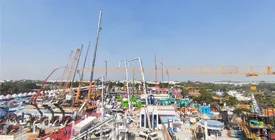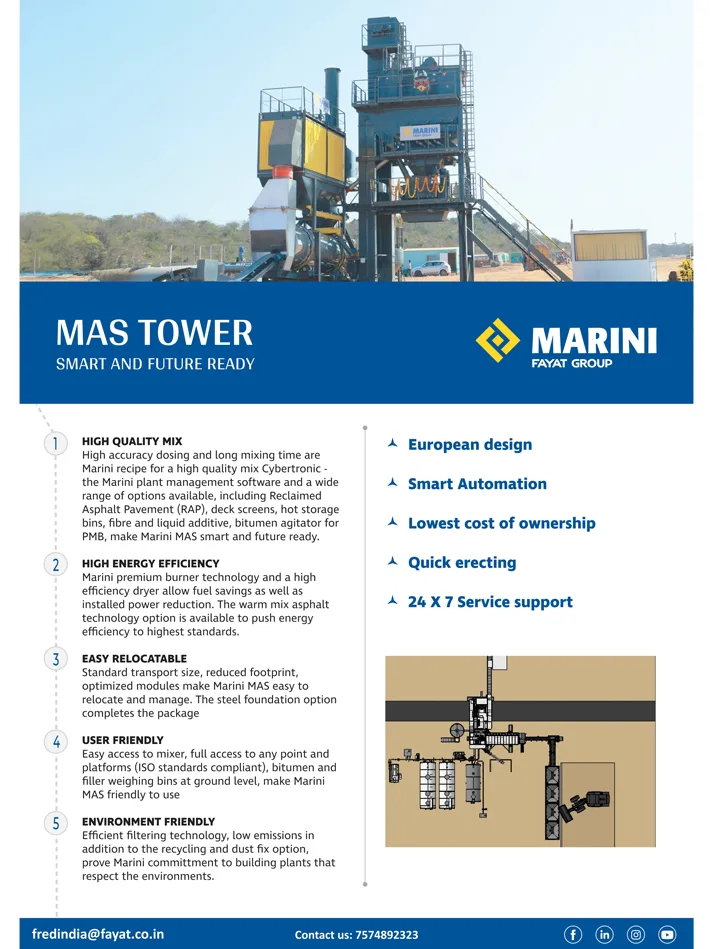Prime Minister Modi to Launch Vadhavan Port Project Groundbreaking on August 30
Prime Minister Narendra Modi will lay the foundation stone for the Vadhavan Port project on August 30, a significant step in expanding India’s port capacity. The deep-water port, located near Dahanu in Maharashtra’s Palghar district, represents a major infrastructure investment of Rs.76,220 crore, marking the first major port development in over two decades.
The Vadhavan Port is set to be the second major port operated as a company, following the model established by Kamarajar Port Ltd near Chennai. The port, approved by the Union Cabinet on June 19, will be constructed offshore on reclaimed land, with material sourced from sand borrow pits near Daman, approximately 50 km away. The port will be developed in two phases by Vadhvan Port Project Ltd, a joint venture between the Jawaharlal Nehru Port Authority (74% stake) and the Maharashtra Maritime Board (26% stake). It will follow the landlord model, where the port authority oversees regulation while private firms handle operations and cargo. The Vadhavan Port is designed to handle 23.2 million TEUs (twenty-foot equivalent units) annually, with facilities including nine container terminals, multi-purpose berths, liquid bulk berths, and Ro-Ro (Roll-on/Roll-off) berths. It will also feature an 8-lane road and two-line rail connectivity. The port’s deep-water capabilities, with a draft of 20 meters, will accommodate large container ships with capacities exceeding 24,000 TEUs.
This new port is expected to alleviate capacity constraints at the existing Nhava Sheva (JN Port) and support India’s growing economy and trade volumes. By offering a modern deep-draft facility, Vadhavan Port aims to boost India’s global competitiveness and enhance manufacturing and business activities.
Strategically positioned on the west coast, Vadhavan Port is set to become a key hub in the Arabian Sea, catering to traffic from East Africa, India’s west coast, and the Persian Gulf, potentially positioning India among the world’s top 10 container ports.
Cabinet Approves Rs.12,200 Crore Thane Integral Ring Metro Rail Project
The Union Cabinet has approved the development of the 29-km Thane Integral Ring Metro Rail Project in Maharashtra, which will feature 22 stations and a total investment of Rs.12,200 crore. This project will construct a metro line encircling the west side of Thane city, with 26 km of the route elevated and 3 km underground.
The development costs will be equally shared by the Government of India and the Government of Maharashtra, with additional funding from bilateral agencies. The project is anticipated to be operational by 2029. Maharashtra Metro Rail Corporation Ltd will oversee the project, which is already in the pre-bid phase. Tender documents are being prepared, and contracts will soon be open for bidding. The new metro line is expected to provide a significant boost to daily commuters, including students and office workers, by offering faster and more economical transportation. The project is projected to handle daily ridership of 6.47 lakh in 2029, 7.61 lakh in 2035, and 8.72 lakh by 2045. Thane, known for its rapid growth and emerging industrial and commercial hubs, currently faces transportation challenges due to its dense population of over 30 lakh residents. The metro line aims to alleviate these issues by improving connectivity and reducing congestion on narrow roads.
Ashwini Vaishnaw, Minister for Railways, Information and Broadcasting, Electronics & Information Technology, highlighted the project’s significance, noting that India has become the third-largest in the world for metro length, a significant increase from five cities with metro systems a decade ago.
Odisha Government to Build 75,000 km of World-Class Roads in 5 Years
To enhance commuter experience and safety, the Odisha government has set an ambitious goal to construct 75,000 kilometers of world-class roads over the next five years.
The initiative involves various state departments, each assigned specific targets to ensure the smooth execution of the project. The Rural Development Department is tasked with building the largest portion, 30,000 kilometers of roads. The Panchayati Raj and Drinking Water Department will develop 22,800 kilometers, while the Works Department is responsible for 15,000 kilometers. Additionally, the Water Resources Department will construct 5,000 kilometers, the Housing and Urban Development Department 1,200 kilometers, and the National Highways Authority of India (NHAI) will oversee 1,000 kilometers. A high-level meeting has recently been convened to finalize the plan, with departments instructed to create detailed roadmaps for their assigned projects. A project monitoring unit will be established within the Works Department to coordinate efforts, review progress, and prepare analytics for policy-making. A steering committee led by the Chief Secretary, along with the Development Commissioner and department secretaries, will oversee the implementation. A State Road Policy will be developed to standardize construction parameters, manage road transfers between agencies, and set maintenance norms. A sub-committee, chaired by the Engineer-in-Chief of the Works Department and including representatives from the Roads, Water Resources departments, and NHAI, will draft the policy. The initiative also includes standardizing bridge designs to expedite the finalization of structural plans. This project aligns with the promises made in the BJP manifesto to develop world-class roads in both rural and urban areas.
Cabinet Approves Rs.2,954 Crore Extension of Pune Metro Phase 1
The Union Cabinet has approved the extension of the Pune Metro Phase-1 project, which will span an additional 5.46 km at a cost of Rs.2,954 crore. This extension will include three new underground stations, linking key areas such as Market Yard, Bibwewadi, Balaji Nagar, and the Katraj suburbs. Set to be completed by February 2029, the extension project will be funded equally by the Government of India and the Government of Maharashtra, with additional support from bilateral agencies. “This extension will significantly improve connectivity between Pune’s southernmost areas and the northern, eastern, and western regions through the District Court interchange station, ensuring smoother travel within and beyond the city,” stated a government spokesperson.
Maharashtra Metro Rail Corporation Ltd will manage the project, covering civil, electro-mechanical, and other related works. The corporation has already initiated pre-bid processes and is preparing tender documents, with contracts anticipated to be issued soon.
IndiGrid Partners with Norwegian Climate Investment Fund, Others for Transmission Projects in India
Power sector infrastructure investment trust IndiGrid announced that it has formed strategic partnerships with British International Investment (BII), the Norwegian Climate Investment Fund, and Techno Electric and Engineering Company to develop greenfield Interstate Transmission System (ISTS) projects across India.
During the fiscal year 2024, IndiGrid successfully operationalized its first greenfield ISTS project, Kallam Transmission, and secured five additional projects in both ISTS and Battery Energy Storage Systems (BESS). These projects represent a tentative capital expenditure of approximately Rs.2,000 crore, which is set to be deployed over the next 12-24 months. As part of this collaboration, BII and Norfund (through KNI India AS, Norfund’s joint venture with KLP, Norway’s largest pension company) will invest in three of IndiGrid’s ISTS projects won last year, which are currently under construction. These projects include Ishanagar Power Transmission (IPTL), Dhule Power Transmission (DPTL), and Kallam Transco (KTCO). The projects aim to support the evacuation of around 6 gigawatts (GW) of renewable energy in the states of Madhya Pradesh and Maharashtra. Additionally, Techno Electric and Engineering Company will co-develop the IPTL and DPTL projects. Techno will contribute minority capital and will be responsible for the complete execution of these projects on a Lump Sum Turnkey (LSTK) basis. IndiGrid plans to acquire full ownership of these projects once they become operational and start generating revenue.
Rohit Anand, Head of Infrastructure Equity, Asia at British International Investment, emphasized the importance of this initiative, stating, “India requires a substantial investment of Rs.4.75 lakh crore in the transmission sector to facilitate the integration of renewable energy capacities and meet its decarbonization goals. As a long-term partner and committed climate finance provider to India, we are delighted to bring not just our capital but also our ESG expertise to support the transmission sector, which is a vital part of India’s energy transition.”
IndiGrid CEO Harsh Shah highlighted the growth potential, saying, “On the back of India’s commitment to energy transition and grid parity across renewable energy technologies, including BESS, we are witnessing tremendous investment opportunities in our target areas. This offers a compelling prospect for investors with a preference for sustainability.”
Shipping Ministry Proposes New Port Construction in Andhra Pradesh to Complement Planned Refinery.
The Shipping Ministry has proposed constructing a new seaport in Andhra Pradesh alongside Bharat Petroleum Corp’s (BPCL) planned refinery. This strategic move aims to streamline development and reduce costs by integrating the port’s construction with the refinery.
A senior official from the Shipping Ministry recently informed federal and Andhra Pradesh officials about this plan, emphasizing its economic benefits. Integrating the port with the refinery is expected to lower construction costs and provide a steady stream of business for the port, with the refinery serving as a key anchor customer. Indian refineries, which primarily import crude oil, benefit significantly from proximity to ports to facilitate cost-effective sourcing of inputs. Andhra Pradesh has offered land options at Machilipatnam, Ramayapatnam, or Mulapeta for the proposed refinery and associated petrochemicals complex.
Government Invites Bids for AI Infrastructure Providers Under Rs.10,372 Crore India AI Mission
The government has announced a call for bids to empanel artificial intelligence (AI) infrastructure providers under the Rs.10,372-crore India AI Mission, which received cabinet approval in March. The mission aims to develop a robust AI ecosystem by providing access to high-speed computing infrastructure, including graphics processing units (GPUs), accelerators, and Tensor Processing Units (TPUs), to various stakeholders such as academia, startups, researchers, and government bodies.
Empaneled entities, including data centers and cloud service providers, will offer these AI services at competitive rates determined through the bidding process. The mission, managed by IndiaAI under the Digital India Corporation, will feature over 10,000 GPUs to support the development of AI technologies.
Abhishek Singh, Additional Secretary at the Ministry of Electronics and IT (MeitY), emphasized that the IndiaAI Mission aims to address the high cost of GPU-based cloud services in India, which are currently double the rates in countries with extensive GPU installations. The bid document, issued by MeitY, specifies that the selected agencies will provide high-performance computing, network, and storage services necessary for the mission’s initiatives, including the development of large language models (LLMs) and other AI applications. The process will involve a transparent bidding procedure to ensure that AI services are provided at the lowest possible rates. Empaneled providers will be engaged for a 36-month period, with the potential for extension based on mutual agreements. The IndiaAI Mission will subsidize the AI service costs for approved projects. Interested bidders must be capable of offering 1,000 AI compute units within six months of signing the agreement, with each unit required to have a processing speed of at least 15 teraflops (TFLOPS). Nvidia, a leading GPU manufacturer, is expected to play a significant role in this initiative. The deadline for bid submissions is September 6.
Cabinet Approves Rs.15,611 Crore for Bangalore Metro Rail Phase-3
The Cabinet recently greenlit Phase-3 of the Bangalore Metro Rail Project, which will see the development of two elevated corridors stretching 44.65 km and comprising 31 stations, at a cost of Rs.15,611 crore. Phase-3 includes Corridor-1, running 32.15 km from JP Nagar 4th Phase to Kempapura along the Outer Ring Road West, featuring 22 stations. Corridor-2 extends 12.50 km from Hosahalli to Kadabagere along Magadi Road, with nine stations. Upon completion, Bengaluru’s metro rail network will total 220.20 km. “This expansion will significantly ease traffic congestion and improve connectivity across key areas of Bengaluru, including the Outer Ring Road West and Magadi Road,” the government stated. The new corridors will provide direct access to the international airport and Outer Ring Road East, connecting major IT hubs and integrating with existing and upcoming transport facilities, including bus stands and railway stations. The project is expected to handle around 2.6 million riders daily once operational.
TN CM Stalin Urges Union Minister to Boost Funding for State Railway Projects.
Tamil Nadu Chief Minister MK Stalin expressed frustration recently over the reduction in fund allocation for Southern Railway projects. In a letter to Union Railway Minister Ashwini Vaishnaw, Stalin urged for increased funding to support new railway lines, doubling projects, and customer amenities in the state. Stalin highlighted a significant decrease in funding, noting that the allocation for Southern Railways in the regular budget for the financial year 2024-2025 has been considerably lower than the Interim Budget’s provisions. The reduction of Rs.674.8 crore for new line projects, including key works such as the Sriperumbudur-Guduvanchery line and the Chennai-Cuddalore-Mamallapuram route, is expected to impact the progress of several important projects in Tamil Nadu. Additionally, the reduction of Rs.285.64 crore for doubling projects, such as the Villupuram-Dindigul and Chennai Beach-Chennai Egmore routes, will likely hinder the development of these essential infrastructure projects. Stalin also urged for expedited action on pending railway works in Chennai and surrounding areas, specifically concerning the Kilambakkam bus terminus, EMU services, and MRTS lines. He emphasized that these critical projects should not face delays due to funding shortages. The Chief Minister called for immediate attention to ensure these vital railway projects proceed without further hindrance.
Cabinet Greenlights Major Infrastructure Projects Worth Rs.33,727 Crore
In a significant move to enhance the country’s transportation infrastructure, the Union Cabinet chaired by Prime Minister Narendra Modi recently approved five major projects totaling an investment of Rs.33,727 crore. The projects include the development of new civil enclaves at Bagdogra Airport in West Bengal and Bihta Airport in Bihar, as well as extensive metro rail expansions in Pune, Thane, and Bengaluru.
Airport Developments in Bagdogra and Bihta
The Cabinet approved proposals from the Airports Authority of India (AAI) for the development of new civil enclaves at Bagdogra Airport in Siliguri, West Bengal, and Bihta Airport in Patna, Bihar. The estimated costs for these projects are Rs.1,549 crore and Rs.1,413 crore, respectively. The proposed terminal building at Bagdogra Airport will span 70,390 square meters and is designed to accommodate 3,000 peak hour passengers, with an annual capacity to handle 10 million passengers. Key components of the project include the construction of an apron capable of accommodating 10 parking bays for A-321 type aircraft, two link taxiways, and multi-level car parking facilities.
“This development is poised to significantly enhance Bagdogra Airport’s operational efficiency and passenger experience, reinforcing its role as a pivotal air travel hub for the region,” said Ashwini Vaishnaw, Minister of Information Technology and Information & Broadcasting, during a briefing after the Cabinet meeting.
Similarly, the new integrated terminal building at Bihta Airport will cover 66,000 square meters and is designed to handle 3,000 peak hour passengers, catering to 5 million passengers annually. The facility is planned for future expansion to accommodate up to 10 million passengers per annum as demand increases.
Metro Rail Expansions in Pune, Thane, and Bengaluru
The Cabinet also approved significant expansions of metro rail networks in three major cities to improve urban mobility and reduce traffic congestion.
Pune Metro Phase-1 Extension
An extension of Pune Metro Phase-1 from Swargate to Katraj has been sanctioned, covering a distance of 5.46 kilometers at a total cost of Rs.2,954.53 crore. The extension, known as Line-1B, will feature three underground stations connecting key areas such as Market Yard, Bibwewadi, Balaji Nagar, and the Katraj suburbs. The project is expected to be operational by February 2029.
Thane Integral Ring Metro Rail Project
The Thane Integral Ring Metro Rail Project received approval with an estimated total cost of Rs.12,200 crore. The 29-kilometer ring corridor comprises 26 kilometers of elevated tracks and 3 kilometers underground, encompassing 22 stations. The metro line will connect prominent areas including Naupada, Wagle Estate, Dongripada, Hiranandani Estate, Kolshet, and Saket. The project is slated for completion by 2029.
Bengaluru Metro Rail Project Phase-3
Two corridors of Bengaluru Metro Rail Project Phase-3 were approved, extending over 44.65 kilometers with 31 stations at a total estimated cost of Rs.15,611 crore. The corridors include:
Corridor-1: From JP Nagar 4th Phase to Kempapura along the Outer Ring Road West, spanning 32.15 kilometers with 21 stations.
Corridor-2: Details of the second corridor were not specified in the announcement.
Upon completion by 2029, Bengaluru will have an active metro network of 220.20 kilometers. The Phase-3 expansion aims to connect previously underserved western parts of the city, integrating key areas such as the Peenya Industrial Area, IT hubs along Bannerghatta Road and Outer Ring Road, manufacturing units on Tumkuru Road, and prominent educational institutions like PES University and Dayananda Sagar University.
Economic Impact and Future Outlook
Highlighting the government’s commitment to infrastructure development, Minister Ashwini Vaishnaw stated, “Within a short timeframe since June this year, in the initial few meetings of the Cabinet, around Rs.1.54 lakh crore worth of infrastructure projects have been approved. Including today’s approvals, it has reached around Rs.2 lakh crore. These projects will generate more employment opportunities and drive economic growth.”
The approved projects are expected to not only improve transportation facilities across the respective regions but also contribute significantly to economic development by creating jobs and facilitating smoother movement of people and goods.
IndoSpace to launch two new industrial & logistics parks in Karnataka
IndoSpace, India’s leading developer of Grade A industrial and logistics real estate, announced two new hubs in Karnataka at an investment of Rs.580 crores. Spread over 75+ acres, they will cater to a range of industries, from automobiles, engineering, and electronics, as well as Third Party Logistics (3PL) operators.
These two new parks are fulfilment of a commitment by IndoSpace in a Memorandum of Understanding signed with the state government.
The MoU envisaged an investment of Rs.3,000 crores in the logistics sector in Karnataka. IndoSpace Nelamangala II logistics park envisages an investment of Rs.240 crores and spans over 35+ acres. The park is strategically positioned along the Bengaluru-Mumbai highway (NH48), and is set to enhance the region’s industrial capabilities, providing top-tier facilities for companies in diverse sectors.
IndoSpace Narasapura II, with an investment of Rs.340 crores is spread across 40+ acres, and situated off Old Madras Road, (NH 75), with proximity to major industrial hubs like Vemgal, Malur, and Hoskote. The park is designed to offer a state-of-the-art infrastructure to meet the demands of manufacturers from diverse industries.
IndoSpace already has three operational logistics parks in Karnataka. IndoSpace Nelamangala I is spread over 16 acres, IndoSpace Bommasandra, on the new Bengaluru – Chennai highway spans 5.4 acres; and Narasapura I is spread over 64 acres.
Rajesh Jaggi, Vice Chairman, Real Estate, The Everstone Group, said, “ We are excited to be an integral part of Karnataka’s industrial growth story with our strategically located, well-connected logistics parks. Our investment of over Rs.580 crores in these two new state-of-the-art parks spread over 75+ acres in Karnataka, we continue to scout for more opportunities to serve this state’s and India’s economy.”
Andhra Pradesh to Upgrade Four Roads in Northern Region to Four-Lane Roads
The Andhra Pradesh government is considering a major upgrade of four key roads in North Andhra to four-lane status to improve connectivity, boost spiritual tourism, and alleviate traffic congestion. This initiative also aims to enhance links to tribal regions and interstate roads, benefitting both local and cross-border travel.
The proposed upgrades include:
- Vizianagaram to Palasa Road: Stretching 160 kilometers, this road will connect Chipurupalli, Rajam, Palakonda, Kotturu, and Palasa in Andhra Pradesh with Parlakhemundi in Odisha. It will also facilitate access to Meliaputti, Chapara, and other locations in Srikakulam. This route is expected to serve as an important interstate link and support tribal communities in marketing their agricultural products.
- Rambhadrapuram to Chilakapalem Road: This 60-kilometer stretch, passing through Rajam and Ponduru, is also proposed for a four-lane upgrade.
- Rambhadrapuram to Rayagada Road: This road, extending to Parvathipuram and crossing into Odisha, will serve as a vital interstate connection.
- Nellimarla Junction to Ranastalam Road: Connecting Ramatheerdhalu, this road will facilitate access to significant spiritual sites, including the Majji Gairamma Temple in Rayagada and the Lord Kodanda Rama Swamy Temple in Ramatheerdham, potentially boosting tourism.
Vizianagaram MP Kalisetti Appala Naidu recently met with Chief Minister Nara Chandrababu Naidu to advocate for these upgrades. CM Naidu responded positively, pledging to advance the development of these four-lane roads.
The improvements are expected to streamline travel from tribal areas to urban centers like Vizianagaram and Visakhapatnam, significantly enhancing regional infrastructure. MP Appala Naidu urged the government to expedite the project to benefit both local communities and visitors.
JSW Energy Subsidiary Signs 300 MW Solar Power Purchase Agreement in Karnataka
JSW Renew Energy Twenty Limited, a wholly-owned subsidiary of JSW Energy, has secured a Power Purchase Agreement (PPA) with Bangalore Electricity Supply Company Limited (BESCOM) for a 300 MW solar project at Pavagada Solar Park in Karnataka. The agreement guarantees power supply at a tariff of Rs.2.89 per kWh until FY 2044, with the project slated for commissioning within 18 months.
The PPA follows a letter of award received from Karnataka Renewable Energy Development Limited (KREDL) on July 22, 2024. With this latest addition, JSW Energy’s solar pipeline capacity now totals 3.2 GW, with PPAs signed for 1.3 GW.
The company’s overall locked-in generation capacity has reached 16.7 GW, which includes 7.5 GW of operational capacity and 2.3 GW under construction across various energy sectors. JSW Energy is targeting a generation capacity of 20 GW by 2030.












